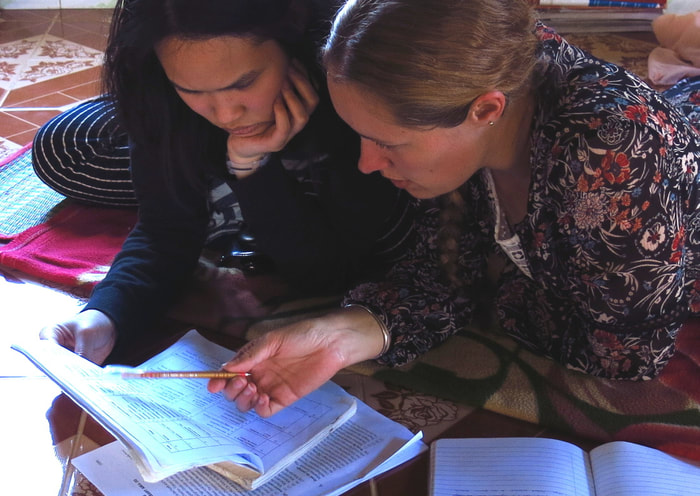|
After two weeks of IELTS practice, Van and I are ecstatic that an improvement has been made. After a further week, frustration colours our trainee's cheeks as he sighs up into his growing fringe. We have plateaued in the reading sections of the IELTS (International English Language Testing System) test. Data-driven, Van and I look at one another. Are you thinking what I’m thinking? The answer was a resounding ‘Yes!’ as we grabbed the IELTS practice test books, pen and paper. As Van poises the pen over the clean sheet, I turn pages barking what type of questions are in each of the reading passages. We want to learn if passage 1 has a preponderance of true/false; does passage 3 rely on sentence matching or is it an even spread? We want to know exactly what he’s going to have to improve on and be able to direct him to skip questions he finds challenging and concentrate on those parts that he is likely to do well in. After checking each of the three available books, I return to the beginning to count the number of each question type. The matching type of question comprises one third of the entire test question bank. True/False/Not Given (T/F/NG) types of questions make up three quarters of these matching style questions alone. With an even spread over all three reading passages, T/F/NG is in 90% of the test passages that we surveyed. Overall we learnt that the matching activities are more likely to appear in reading passages two and three, with a one or two-word summary being favoured for passage one; the easiest of the three tasks.
Having learnt that the weak areas for our student comprise 70% of the test, we need to devise a strategy for revision. We have two choices; either carry on trying all of the questions and hope that with time the two harder categories will improve. Or, we can choose to ignore the easier, less numerous questions and concentrate solely on those which the student finds tough. Van always mass answers questions until she knows exactly how to find that particular answer; she will go through the practice sections to find all of her weakest question type. We want to push our student, but it is a fine balance. He does not yet have the will power to sit for hours answering the same form of question. He is competitive, but not honed. Advising someone who has never before revised for such a test is quite an undertaking. Each person has their own method of revision and test-taking. I personally run through the test as quickly as I can; scanning questions and texts for respective answers. I note down any obvious answers that jump off the page at me before returning to the start and answering in a more stayed fashion. Van chooses to answer the types of questions that she knows she excels in first and then tackles the trickier ones. Now that we have access to the data, we have a solid basis on which to try different methods. Chloe Smith NEH Director of Studies and Teacher Trainer Related Posts: To Write or Not to Write The Head Monk's English Classes Testing Grade 8 English
Comments
|
This section will not be visible in live published website. Below are your current settings: Current Number Of Columns are = 3 Expand Posts Area = 1 Gap/Space Between Posts = 20px Blog Post Style = card Use of custom card colors instead of default colors = Blog Post Card Background Color = current color Blog Post Card Shadow Color = current color Blog Post Card Border Color = current color Publish the website and visit your blog page to see the results |
|
© New Education Highway 2024
Except where otherwise noted, content on this site is licensed under a Creative Commons Attribution 4.0 International License. |


